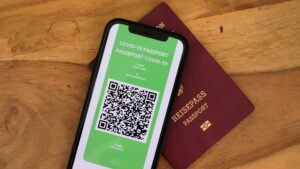
By Mackenzie Newlyn, Contributor and Undergraduate at the University of York
When looking at overcoming COVID-19, or at least learning to live in a world altered by the pandemic, vaccinations are evidently vital to the discussion. One of the biggest changes already seen in society has been the easing of lockdown measures alongside vaccinations, those that have been vaccinated now able to avoid periods of isolation (now just asked to take a PCR test) as well as attend mass gatherings. There have been varying solutions found to allow people to attend these events, typically evidence of a negative LFT test 24/48 hours prior to entry, but with the increase in vaccinated people an easier solution has been introduced.
Going by multiple titles, ranging from COVID vaccine passports, immunity certificates, NHS COVID pass, or the UK government referring to them as ‘COVID status certification’; this documentation provides a more permanent piece of evidence that someone is vaccinated and should be allowed entry. The ‘passport’ itself is currently in the form of an individualised QR code lasting up to 28 days, kept on your phone. This QR code given out in the UK is currently recognised in 30 countries so far, including popular holiday destinations such as Spain and Greece yet current advice remains to regularly check the individual laws and rules in place at the intended country of travel.
Once in possession of this immunity certification, it can be used for domestic travel if two weeks have passed since your second dose or if up to 6 months have passed since a positive PCR test and you have finished isolating. It is also anticipated that evidence of vaccination will need to be provided in high risk settings such as concerts or night clubs. Using an app for entry to these events is not a new concept. Multiple venues now use similar QR codes as digital tickets for events, which also reduce the likelihood of misplacing physical ticketed entry. With QR code usage alongside the NHS COVID app, the government has also eased the public into the idea of digital solutions, although this digitisation has issues in itself.
Throughout the pandemic, there has been increased evidence of a worldwide digital divide through unequal access to digital infrastructure, meaning a non-digital alternative is required. This is offered in the UK with a physical paper alternative to the digital QR code, with obtaining it supposedly as simple as requesting a letter. A paper alternative is more vital than ever through the necessity of internet connectivity, a prominent example of this stark divide. While 84% of UK adults have access to mobile phones, this equates to a mere 53% of people aged 65+ with mobile phone access. Due to this, those without access to mobile phones are left isolated due to the NHS app needing internet usage to be accessed at regular intervals for venue information and, at times, to register attendance using the QR code. It is therefore shown that this digital divide is still prevalent with access to certain venues not being permitted without the usage of the QR code.

However, a paper alternative also introduces the concept of paper passport forgery and the safety risks of having both a paper passport and a QR code. While the use of a QR code has already had issues such as data theft, the possibility of faking a COVID pass letter could inherently reduce the legitimacy of the individualised QR codes. There are already reportedly more than 1,200 vendors currently operating in the UK offering false documentation for as little as £25, making it relatively simple to obtain the papers to engage in social events while subsequently putting others at risk.
In addition, the concept of documentation being required to do previously undocumented tasks hasn’t been easily accepted by all, as seen by the multiple protests in France against the use of vaccine passports. The French government has brought into law the requirement to have a Pass Sanitaire in order to take part in almost all social events such as eating out, traveling and going to the cinema. Although on principle acting as the perfect solution to allow cultural events to return to relative normalcy, it segregates those that have not taken the vaccinations. This has been viewed to be an infringement on civil liberties, controversially demonstrated through protestors wearing yellow stars (reminiscent to the ones the Nazis forced Jewish people to wear) labelled ‘not vaccinated’ and therefore aligning the French government with Nazi Germany during World War II. This has already created further divides in France, adding fuel to the flames of the already controversial topic of vaccine passports.
It is clear that the introduction of vaccine passports is a potential solution that needs to be considered, and at first glance appears to mitigate the continuing challenges posed by COVID-19. However, as outlined, this comes with its own risks such as digital exclusion and forgery as well as the argument of civil liberties infringement. Through looking through these risks, we can begin to decide if this solution is worth the costs in the long run. At the very least, something similar will have to be required in society when looking at the future of live events, however it is apparent that this must be discussed in great detail to ensure a viable long-term solution.